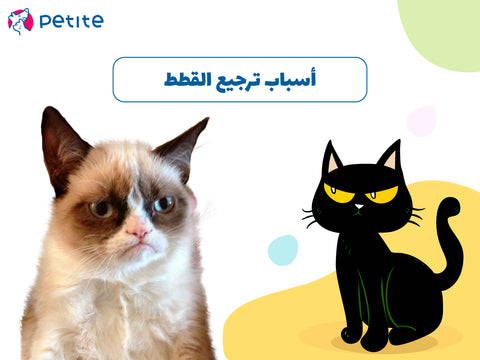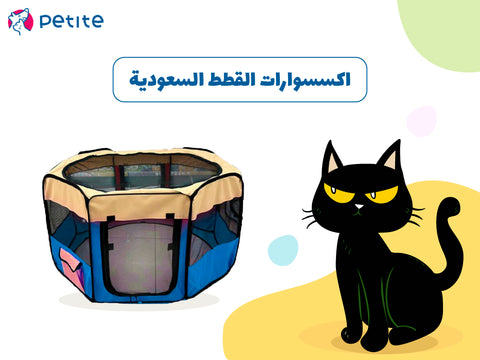There are many reasons for vomiting in cats, and cat owners are greatly concerned when vomiting occurs frequently in cats. This is due to the lack of knowledge of the main reason that causes cats to vomit in this way, especially in the event of a recurrence of the problem or other damage that appears on the cats, so we will learn about the reasons that lead to vomiting in cats. Because vomiting occurs in cats, as well as some methods that can help in treatment.
Reasons for regurgitation and regurgitation of cats
Cat vomiting and vomiting can be the result of several reasons, and each of the reasons for cat vomiting may have some other complications that happen to cats, so you must know these reasons, which we will mention in the following:
Food allergies: Some cats may be sensitive to some food ingredients, and eating them may lead to vomiting.
Eating foreign materials: The cat may eat foreign materials such as threads, leaves, etc., or eat foods that are not suitable for eating, which leads to vomiting to get rid of them.
Stomach and intestinal infections: Infections in the stomach and intestines may also cause vomiting, because they will cause problems in the digestive process.
Poisoning: Ingestion of some toxic substances can lead to this problem as well.
Stress and Tension: Some cats suffer from stress or psychological stress which can lead to regurgitation.
Changes in diet: Rapid changes in the type of food or diet can also cause regurgitation in cats.
Liver infections: Cats suffering from liver infections can be one of the reasons for regurgitation.
Parasitic infestation: Worms and parasites that may infect cats can cause digestive problems and vomiting.
Please be careful if the cat suffers from frequent vomiting or if there are other symptoms such as weight loss or behavioral fluctuations, because in this case the matter may be serious, and it is preferable to consult a veterinarian to determine the cause and appropriate treatment.
The color of cat poop
The color of the cat's vomit varies depending on the reasons for the cat's vomiting. This color may be an indicator of the cat's general health condition, so this color must be noted to inform the veterinarian to obtain appropriate treatment. Among the most common colors of cat vomiting are the following:
Yellow color: It may be due to the excretion of bile, which is a liquid that is secreted in the liver and stored in the gallbladder. This indicates that the stomach has been emptied of nutritional content.
Green color: It may be the result of the cat eating grass, especially since cats do not eat grass commonly, so it is quickly excreted from the stomach because it is considered a foreign body.
Blue or purple color: may be an indication of heart or respiratory problems.
Black or dark brown color: It may be due to the cat eating blood, and this may also be related to bleeding in the digestive system.
Red color: It may indicate the presence of blood in the vomit, and it can occur as a result of bleeding in the stomach or intestines.
White or cream color: It could be the result of the cat eating milk or dairy products, and it may be natural and not dangerous.
In all cases, if the vomiting problem continues for a long time or is accompanied by other signs such as weight loss, loss of appetite, or changes in behavior, you must consult a veterinarian for accurate evaluation and diagnosis, and it is not preferable to neglect the condition or give cats any medications or treatments without consulting a doctor in the first place.
Treating cat vomiting at home
After knowing the reasons for cats vomiting, it has become easier to determine the reason that results in this vomiting. It should be noted that treatment must be completed by a veterinarian, but some tips must be followed at home to speed up the healing process, as well as to reduce any complications that may occur to cats, and these tips include:
Monitor the cat's behavior and carefully evaluate the symptoms. If there are additional signs appearing on the cat that indicate further damage, you should contact the veterinarian.
Make sure to provide the cat with enough water to avoid dehydration.
Dividing meals into small, frequent meals throughout the day may help reduce the likelihood of vomiting.
It may be useful to use a light, easily digestible food, especially if the cat suffers from digestive problems.
Avoid changing the type of food suddenly, and if necessary, gradually change over the long term.
Your cat may benefit from a calm and comfortable environment, especially if the vomiting is due to stress.
You should avoid giving the cat any medications without consulting a veterinarian, even if they have been previously used on another cat, as the treatment may be different depending on the cause of the vomiting.
Treating vomiting in cats with herbs
Using herbs as a treatment for cat vomiting requires caution, as some herbs can be beneficial while others can be harmful, especially since the causes of cat vomiting are many, and the susceptibility of cats to these herbs is unknown, so it is preferable to always try any herbal treatment. Consult a veterinarian to ensure the safety and effectiveness of treatment.
It should be noted that herbs are used because it is widely believed that they have the ability to soothe the stomach, which helps relieve any stomach juices or inflammation, but there are no reliable practical studies that confirm this matter, so it is always preferable to try herbs in very small quantities on infected cats, and this is to ensure There are no negative effects of these herbs on cats, and the types of herbs commonly used for cats include the following:
Mint: Mint is one of the herbs that may help calm the stomach and relieve nausea, so mint can be served in the form of tea after cooling it in the cat’s bowl.
Ginger: Ginger is one of the herbs known for its soothing effect on the digestive system. Grated ginger can be mixed with cats’ favorite food in small quantities, or served as a liquid after boiling it in water.
Cumin: It is believed that cumin can help stimulate the digestion process and relieve nausea, so ground cumin can be added to the diet.







Comments (0)
There are no comments for this article. Be the first one to leave a message!